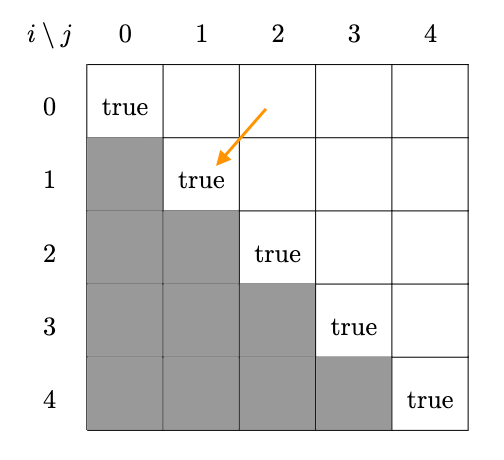Longest Palindromic Substring
Table of contents
Problem
Given a string s, return the longest palindromic substring in s.
Explanation
The solution uses dynamic programming, with the memoization matrix $M[i,j]$ defined as follows:
\[M[i,j] = \begin{cases} \text{true} & \text{if } s[i, j] \text{ is a palindrome} \\[0.5em] \text{false} & \text{otherwise} \end{cases}\]where $s[i, j]$ is the substring of $s$ from index $i$ to index $j$ (inclusive).
One thing to note is that a substring of length $1$ is always a palindrome. This will be our base case:
\[M[i,i] = \text{true} \quad \forall i \in [0, n)\]
If we want to know if substring $s[i, j]$ is a palindrome,
For substrings of length $2$, it suffices to check $s[i] = s[j]$.
For substrings of length $l \geq 3$, in addition to checking $s[i] = s[j]$, we also need to check if $s[i+1, j-1]$ is a palindrome ($M[i+1, j-1] = \text{true}$)
Checking $s[i+1, j-1]$ is a palindrome is equivalent to checking the value of the cell at the one left-bottom diagonal of $M[i,j]$ (the orange arrow).
To ensure that $M[i+1, j-1]$ is already computed before computing $M[i,j]$, we need to make sure that we are computing the cells in the matrix in the right order.
The computation order must be in a diagonal fashion, starting from $M[0,1]$ and going to the right bottom.
We can do this by fixing the length of the substring $l$, and then iterate through the string $s$ from left to right.
Solution
1
2
3
4
5
6
7
8
9
10
11
12
13
14
15
16
17
18
19
20
21
22
23
24
25
26
public String longestPalindrome(String s) {
int n = s.length();
boolean[][] M = new boolean[n][n];
for (int i = 0; i < n; i++) {
M[i][i] = true; // Set base case
}
int max = 1;
int start = 0;
for (int l = 2; l <= n; l++) {
for (int i = 0; i < n - l + 1; i++) {
int j = i + l - 1;
boolean isPalindrome = s.charAt(i) == s.charAt(j);
isPalindrome = isPalindrome && (l == 2 || M[i + 1][j - 1]);
if (isPalindrome) {
max = l;
start = i;
}
M[i][j] = isPalindrome;
}
}
return s.substring(start, start + max);
}
The complexity of the solution is $O(n^2)$.